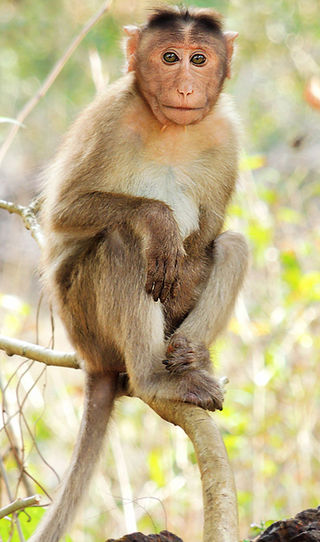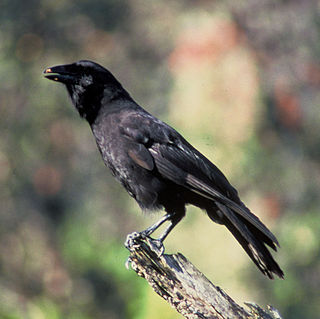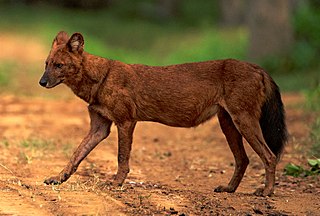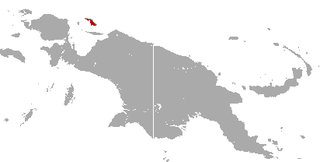
The International Union for Conservation of Nature (IUCN) Red List of Threatened Species, also known as the IUCN Red List or Red Data Book, founded in 1964, is an inventory of the global conservation status and extinction risk of biological species. A series of Regional Red Lists, which assess the risk of extinction to species within a political management unit, are also produced by countries and organizations.

The screamers are three South American bird species placed in family Anhimidae. They were thought to be related to the Galliformes because of similar bills, but are more closely related to the family Anatidae, i.e. ducks and allies, and the magpie goose, within the clade Anseriformes. The clade is exceptional within the living birds in lacking uncinate processes of ribs. The three species are: The horned screamer ; the southern screamer or crested screamer ; and the northern screamer or black-necked screamer.

The macaques constitute a genus (Macaca) of gregarious Old World monkeys of the subfamily Cercopithecinae. The 23 species of macaques inhabit ranges throughout Asia, North Africa, and Europe. Macaques are principally frugivorous, although their diet also includes seeds, leaves, flowers, and tree bark. Some species such as the long-tailed macaque will supplement their diets with small amounts of meat from shellfish, insects, and small mammals. On average, a southern pig-tailed macaque in Malaysia eats about 70 large rats each year. All macaque social groups are arranged around dominant matriarchs.

Oryx is a genus consisting of four large antelope species called oryxes. Their pelage is pale with contrasting dark markings in the face and on the legs, and their long horns are almost straight. The exception is the scimitar oryx, which lacks dark markings on the legs, only has faint dark markings on the head, has an ochre neck, and has horns that are clearly decurved.

Trachypithecus is a genus of Old World monkeys containing species known as lutungs, langurs, or leaf monkeys. Their range is much of Southeast Asia.

Leptotyphlops is a genus of nonvenomous blind snakes, commonly known as slender blind snakes and threadsnakes, in the family Leptotyphlopidae. The genus is endemic to and found throughout Africa. Eleven species have been moved to the genus Trilepida, and other species have been moved to the genera Epacrophis, Epictia, Mitophis, Myriopholis, Namibiana, Rena, Siagonodon, Tetracheilostoma, and Tricheilostoma.

An IUCN Red List Critically Endangered species is one that has been categorized by the International Union for Conservation of Nature as facing an extremely high risk of extinction in the wild. As of December 2023, of the 157,190 species currently on the IUCN Red List, 9,760 of those are listed as Critically Endangered, with 1,302 being possibly extinct and 67 possibly extinct in the wild.

A species that is extinct in the wild (EW) is one that has been categorized by the International Union for Conservation of Nature as only consisting of living members kept in captivity or as a naturalized population outside its historic range. Classification requires exhaustive surveys conducted within the species' known habitat with consideration given to seasonality, time of day, and life cycle. Once a species is classified as EW, the only way for it to be downgraded is through reintroduction.

The Ruwenzori shrew is a species of mammal in the family Soricidae. It is the only species within the genus Ruwenzorisorex. It is found in Burundi, Democratic Republic of the Congo, Rwanda, and Uganda. It is semiaquatic, living along streams in tropical cloud forest.

The San Cristobal shrew is a species of mammal in the family Soricidae. It is endemic to Mexico. It is known only from the Huitepec Ecological Reserve west of San Cristóbal de las Casas in the Chiapas Highlands of central Chiapas. It is found at 2,743 m (8,999 ft) elevation in montane cloud forests.

The Mount Kenya mole shrew is a species of mammal in the family Soricidae endemic to Mount Kenya in Kenya. Its natural habitat is tropical high-elevation bamboo and grassland, particularly the bamboo-belt of Mount Kenya and the adjacent heath and grassland.

Phacochoerus is a genus in the family Suidae, commonly known as warthogs. They are pigs who live in open and semi-open habitats, even in quite arid regions, in sub-Saharan Africa. The two species were formerly considered conspecific under the scientific name Phacochoerus aethiopicus, but today this is limited to the desert warthog, while the best-known and most widespread species, the common warthog, is Phacochoerus africanus.

The serow, is any of four species of medium-sized goat-like or antelope-like mammals in the genus Capricornis. All four species of serow were, until recently, classified under Naemorhedus, which now only contains the gorals.

The red serow, also called the Burmese red serow, is a goat-antelope thought to be native to southern Bangladesh and northern Myanmar. It sometimes has been considered a subspecies of C. sumatraensis. In the northeastern part of India, the red serow occurs widely in the hills south of the Brahmaputra river. although the IUCN states that this species is recorded with certainty only from Myanmar, in Kachin State, and that records in India refer to the Himalayan serow.Serow in South and Southeast Asia are threatened by habitat destruction, poaching, and disease transmission from domestic livestock. Myanmar and India face severe poaching issues despite legal protections.

An endangered species is a species that is very likely to become extinct in the near future, either worldwide or in a particular political jurisdiction. Endangered species may be at risk due to factors such as habitat loss, poaching, invasive species, and climate change. The International Union for Conservation of Nature (IUCN) Red List lists the global conservation status of many species, and various other agencies assess the status of species within particular areas. Many nations have laws that protect conservation-reliant species which, for example, forbid hunting, restrict land development, or create protected areas. Some endangered species are the target of extensive conservation efforts such as captive breeding and habitat restoration.

The blue-eyed spotted cuscus or Biak spotted cuscus is a species of critically endangered marsupial in the family Phalangeridae.

Caracal is a genus in the subfamily Felinae of the family Felidae. It was proposed by John Edward Gray in 1843 who described a skin from the Cape of Good Hope in the collection of the Natural History Museum, London. Historically, it was considered to be a monotypic genus, consisting of only the type species: the caracal C. caracal.
Cirripectes heemstraorum, the yellowtail blenny, is a species of combtooth blenny from the family Blenniidae. It is found in the Indian Ocean where it is known from three South African specimens and an Indonesian specimen. It is distinguished from its congeners by the nape having an extensive black flap on both sides of its neck; 10-13 cirri which are found between the neck flaps; an entire dorsal fin; 5-6 cirri above the eye, 6-8 cirri on the nose; the males have small dark spots on their body towards the tail which merge to form short black stripes on caudal peduncle, in life the females have a brilliant yellow caudal fin while in the males only the outer half of the tail is bright yellow.

The Socotran pipistrelle or Lanza's pipistrelle is an endangered species of vesper bat in the family Vespertilionidae. It is endemic to Socotra Island in Yemen, and is the only mammal thought to be endemic to the island.


















